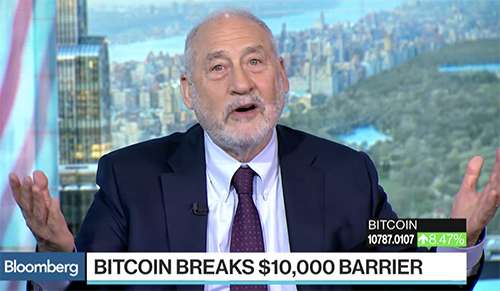Bitcoin Sends Elite Economists Into Glorious Fits of Confusion
Joseph Stiglitz is the George Costanza of economists: Every instinct he has, do the opposite.
If you're looking for another reason to take the plunge and finally buy some bitcoin, check out Nobel Prize-Winning economist Joseph Stigltiz's new interview with Bloomberg, in which he says it should "be outlawed" and warns that the government "could crack down at any moment and then [bitcoin] collapses."
Stiglitz is the George Costanza of economists: Every instinct he has, do the opposite. In 2002, he coauthored an infamous paper concluding that "the risk to the government from a potential default on [Fannie Mae and Freddie Mac] debt is effectively zero." And it's almost a decade to the month since he was in Caracas praising Hugo Chavez's economic policies.

Speaking of Venezuela, Stiglitz also told Bloomberg that bitcoin "doesn't serve any socially useful function." While it's true that cryptocurrency's world-altering potential won't be fully realized until the technology advances quite a bit, it's already enabling the citizens of that country ravaged by socialism to obtain life-saving food and medicine.
Is it that Stiglitz is an advocate of expansive government power in all contexts (he's also urging the U.S. to outlaw cash), or is it that he's too arrogant to bother trying to understand the most successful free-market money system running on the internet? I say both. (Fellow Nobel Laureate Paul The-Internet-Will-Be-About-as-Useful-as-the-Fax-Machine Krugman is also a bitcoin skeptic.)
One of the great pleasures of observing bitcoin's rapid rise in price and prominence is that it's sending elite economists into fits of confusion and stoking their insecurity. ("We ought to just go back to what we always have had," Stiglitz told Bloomberg.)
What Bitcoin has done for me: Taught me to take lofty titles with a grain of salt (professor, Noble Prize winner, etc). Your title doesn't make you an authority on things you don't bother to understand. https://t.co/PoXTGriqeL
— Alan Silbert (@alansilbert) November 29, 2017
In calling for bitcoin to be "outlawed," Stiglitz demonstrated that he doesn't understand that bitcoin is just code, which makes a global ban impossible. Thanks to the recently launched bitcoin satellite service, and a system in development for sending cryptocurrency transactions through radio signals, even shutting down the internet wouldn't stop bitcoin.
Stiglitz is also unaware of one of cryptocurrency's most important paradigm shifts: It turned money into speech, thus affording it First Amendment protection. In the most recent episode of Forbes journalist Laura Shin's excellent Unchained podcast (published before Stiglitz' remarks), the prominent venture capitalist Naval Ravikant (arguably the most articulate thinker in the crypto space) expounded on this point:
What bitcoin did is it turned code into money. So bitcoin is pure code—there's no paper, there's no guns, there's no federal government. It's just pure code. So to stop bitcoin you've got to stop code, and code is actually just speech. It's just a bunch of numbers and letters that I write down and that the computer interprets. So you have to stop me from writing those numbers or letters down in a certain sequence and conveying them to other people, [and then] to stop them from loading it on a computer somewhere in the world, [and then] to stop someone else from then turning that into money. So you can't control the way money flows unless you can stop the developers from…talking to each other, and thinking. And the regime that could do that would probably be one of the evilest regimes on the planet.
Thanks to a landmark 1996 ruling by Judge Marilyn Hall Patel and later affirmed by the Ninth Circuit Court, there's strong legal precedent for the idea that code is speech. Mathematician Daniel Bernstein, with assistance from the Electronic Frontier Foundation, had sued the U.S. government in 1995 for blocking publication of an encryption program he had written. "Computer language is just that, language," Judge Patel wrote in her decision.
Upholding that principle, I believe, will be the most important free speech battle in the years to come.
I explored this topic in a recent video:


Show Comments (103)